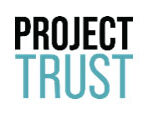
Resources
E-Learning Curriculum
Building and Integrating Trauma-Conscious Service Delivery
This self-paced, 12–16 hour E-Learning curriculum builds trauma-conscious and person-centered practices within diverse stakeholders in the anti-trafficking field.
In the course, you will find:
- Handouts on theory, techniques to be shared with clients, and self-care tools
- Links to online resources including videos, books, articles, and websites.
- Case studies to help service providers think about trauma’s impact on individuals and how they receive services.
- Tips on organizational structure for a more trauma-conscious organization.
- Tools for trauma-conscious service delivery
FEATURED WEBINAR
Enhancing Trauma-Informed Approaches: Building Trauma-Conscious and Person-Centered Practices in Anti-Trafficking Work
Listen to the recording of the launch of Building and Integrating Trauma-Informed Engagement, a self-paced and online training program designed specifically for stakeholders working in the anti-human trafficking field. This 2 hour event includes a diverse panel of individuals who have completed the ten-module learning opportunity.
Our panelists are:
- Dr. Minh Dang, Executive Director, Survivor Alliance
- Kate Keisel, Chief Executive Officer, Sanar Institute
- Lynly Egyes, Legal Director, Transgender Law Center
- Ashante Taylorcox, Executive Director, You Are More Than, Inc.
- Dr. Shobana Powell, CEO and Founder, Shobana Powell Consulting
- Laura Revercomb, JD, Human Rights and Labor Attorney, Legal Expert
- Karen Romero, Senior Director of Training, Freedom Network
- Cristal Mills, Victim Specialist, Federal Bureau of Investigations
FEATURED PUBLICATION
Trauma-Informed Practice in the Field: Recommendations for Human Trafficking Service Providers
This report is the culmination of three years of research by Brandeis’ University’s Institute for Economic and Racial Equity in partnership with Project TRUST. The research was designed to understand how human trafficking providers implement trauma-informed practices and resources and supports they need to become more trauma-informed. Themes the report identifies are:
- Survivor autonomy
- Representative and culturally responsive organizations
- Coalitions and collaborations
See also Brandeis’ original 2019 “State of the Field” report on the survey responses that launched their 2021 report research.
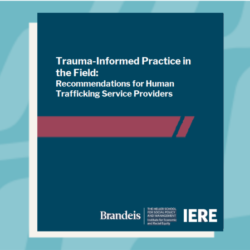
FEATURED WEBINAR & PUBLICATION
Trauma-Informed Case Management with Foreign National Children & Youth Survivors of Trafficking
This toolkit explores the various ways that programs serving foreign national minors can best respond to the complex needs and realities of children who have been trafficked. It provides a flexible framework for working with children who have been trafficked based upon the principles of trauma-informed care.
The recording of the webinar can be found here.
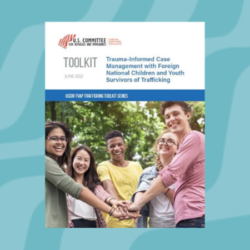
EMERGENCY ASSISTANCE
If you are in need of immediate emergency assistance, contact the National Human Trafficking.
text BeFree (233733)
help@
humantraffickinghotline.org
CONTACT TVAP
If you would like more information about how to enroll in TVAP, speak with your local TVAP service provider or contact us.
ESSENTIAL LINKS
FEATURED WEBINAR
Best Practices in Supporting LGBTQ+ Individuals in Direct Services through a Trauma-Informed Lens
This webinar includes an expert panel of direct service providers supporting the LGBTQ+ community through anti-trafficking service provision. The objectives of this webinar are to:
- Identify barriers to services that LGBTQ+ individuals encounter when exiting trafficking situations
- Articulate core principles of trauma-informed and culturally relevant support for LGBTQ+ individuals
- Identify best practices to implementation of core principles
Webinar Resources: Creating Safer Spaces for LGBTQ+ Individuals
The recording of the webinar can be found HERE
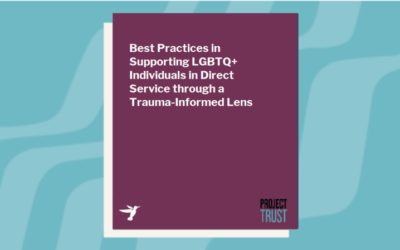
FEATURED WEBINAR
Integrating the Wisdom of Lived Experience in Delivering Trauma-Informed Services
This webinar will include a diverse panel of individuals with lived experience and collective expertise in trauma-informed practices. The objectives of this webinar are to:
- Identify best practices to service delivery through the lens of lived experience
- Share best practices to implementing person-centered policies and programs
- Explore avenues for meaningful survivor leadership in anti-trafficking direct service provision
The recordings of the webinar can be found here:
Part One
Part Two
Webinar Resources: Exploring Intergenerational and Historical Trauma
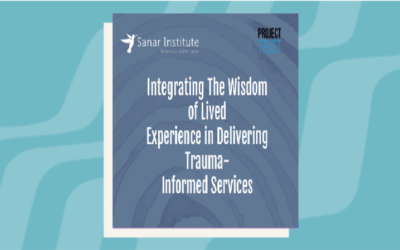
FEATURED WEBINAR
Trauma-Informed Engagement in Legal Settings
This webinar focuses on best practices for responding to and managing trauma responses that may surface while working with individuals with lived experience in human trafficking. The goals of this webinar are to:
- Provide an overview of trauma responses legal professionals may encounter when serving individuals impacted by trauma.
- Identify best practices to trauma-informed and person-centered engagement.
- Educate stakeholders on best practices in implementing trauma-informed engagement skills and tools in a legal setting.
The recording of the webinar can be found here.
Webinar Resources: Supporting Trauma Responses in a Legal Setting and Applying Person-Centered and Trauma-Informed Practices
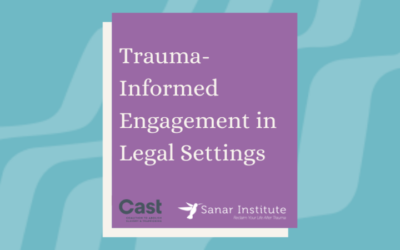
FEATURED WEBINAR
Trauma-Informed Crisis Response & Safety Planning
This webinar provides tools and skills to implement a trauma-informed framework for crisis response and safety planning for individuals impacted by human trafficking.
- Provide an overview of Trauma-Informed Crisis Response
- Highlight Practical Steps to Trauma-Informed Safety Planning
- Explore Best Practices in Applied Practices Through a Case Presentation
The recording of the webinar can be found here
Webinar Resources: Trauma-Informed Crisis Response & Safety Planning Handout
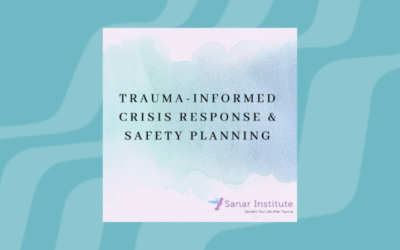
FEATURED WEBINAR
Understanding & Mitigating Trauma Responses
This webinar focuses on best practices in identifying and responding to trauma responses that may be experienced by individuals and communities impacted by human trafficking.
The recording of the webinar can be found here
Use Password: 6qb3c!w%
Webinar Resources: Deep Belly Breathing Handout, Body Scan Handout (Spanish, Simplified Chinese), Cool Down Kit Handout (Spanish, Simplified Chinese), Four Elements Handout, “Promising Practices: An Overview of Trauma-informed Therapeutic Support for Survivors of Human Trafficking”
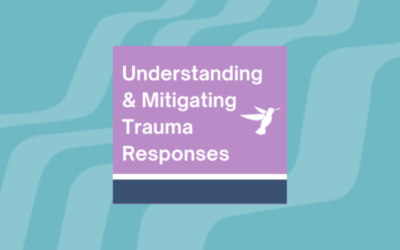
FEATURED WEBINAR
PROVIDING TRAUMA-CONSCIOUS AND PERSON-CENTERED SERVICES IN A VIRTUAL SETTING
This webinar focuses on providing high quality virtual services, with special consideration for increasing access during COVID-19, with the following objectives: building trauma-conscious practices, exploring ethical considerations, and identifying best practices.
The recording of the webinar can be found here.
Webinar Resources: “Nurturing Survivors Forward: A Survivor’s Lens on Trauma-Informed Work During COVID-19.” , “Building Trauma-Conscious and Person-Centered Rapport with Clients in a Virtual Setting”, “Ethical Considerations Supplemental Resources”

FEATURED WEBINAR
EXPLORING INTERSECTIONALITY IN HUMAN TRAFFICKING & DOMESTIC VIOLENCE THROUGH A COMPLEX TRAUMA LENS
This webinar focuses on the intersections of violence, abuse, and exploitation in human trafficking and domestic violence with the following objectives: understanding complex trauma, examining intersectionality, and building trauma-informed practices.
Join moderator Kate Keisel with subject matter experts Nahja Martin, Becky Owens Bullard and Amy Hsieh.
The recording of the October Webinar can be found here.
Use Password: R^#%FfC7
Webinar Resources “Power and Control Wheel” & Human Trafficking Intersections With Domestic and Sexual Violence
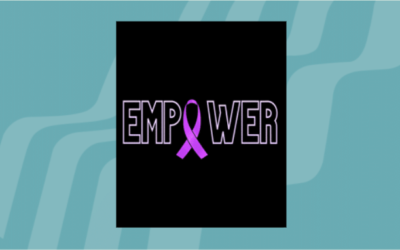
FEATURED PANEL DISCUSSION
CROSS-CULTURAL CONVERSATION: TRAUMA-INFORMED CARE IN THE FIELD OF HV & DV
Hear from 4 dual service providers across the U.S. about their experience implementing trauma-informed response in their work. Panelists’ experiences range from direct case management to leadership.
The recording of the October Webinar can be found here.
Use Password: Trauma1nformed.
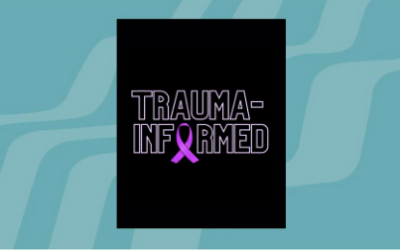
FEATURED PUBLICATION
THE PROJECT TRUST HUMAN TRAFFICKING OUTREACH TOOLKIT
Project TRUST’s Human Trafficking Outreach Toolkit aims to apply trauma-informed practices to human trafficking outreach campaigns. It offers background information on trauma-informed outreach and methods to increase outreach effectiveness and inclusivity.
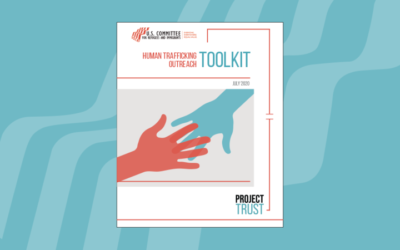
BEST PRACTICES IN TRAUMA INFORMED RESPONSE
Understanding Trauma (The Victim’s Safety and Well-Being Take Priority in All Matters Series)
Applying a Trauma-Informed Approach (The Victim’s Safety and Well-Being Take Priority in All Matters Series)
Trauma-Informed Care for Survivors of Human Trafficking: A State of the Field in 2019
Trauma-Informed Care Resources (The Victim’s Safety and Well-Being Take Priority in All Matters Series)
TIP 57: Trauma-Informed Care in Behavioral Health Services
SAMHSA’s Guidance for a Trauma Informed Approach
NHTH Safety Planning
NCTSN Creating Trauma Informed Systems
NHTTAC Toolkit for Building Survivor-Informed Organizations
Survivor Alliance Fundamentals for Compensation & Expenses for Survivor Consultants

HELPFUL LINKS
Find Providers and Task Forces in your Area
Mindful and Multicultural Counseling
Mental Health Issues Facing the Black Community
The Racial Roots of Human Trafficking, Cheryl Nelson Butler
Provider Self-Care: The Vicarious Trauma Toolkit
Family and Youth Services Bureau Runaway and Homeless Youth Training and Technical Assistance Center Building Trauma-Informed Runaway and Homeless Youth Programs
Sanctuary for Families Guide to Safety Planning during COVID-19
Guiding Principles for Survivor Informed Engagement Toolkit.

TRAFFICKING VICTIM ASSISTANCE PROGRAM (TVAP)

Handouts and Resources
Handouts for Module 1.2: Neurobiology of Trauma
Fight, Flight, Freeze
An Overview of Traumatic Impact on Memory
Types of Memory
Handout for Module 1.4: Types of Trauma Part 2
Handout for Module 1.5: Trauma Responses
Handouts for Module 2.1: Healing Pathways
5 Domains of Post-Traumatic Growth
Building Person-Centered Practices through SAMHSA’s 6 Principles of Trauma-Informed Care
Handouts for Module 2.2: Person-Centered Engagement
Building Trauma-Conscious and Person-Centered Rapport with Clients
Handouts for Module 2.3: Tools and Skills for Trauma-Response Management
5-4-3-2-1 Strategy
Body Scan
Cool Down Handout
COPE Strategy
Diaphragmatic Breathing
Progressive Muscle Relaxation
The Four Elements
Handouts for Module 2.4: Trauma-Conscious Programming
Butterfly Hug
Calming Yoga Series
Guide to Finding a Therapist
Mindfulness Scan
Shake-Out Dance
Handouts for Module 2.5: Vicarious Trauma
Emergency Self-Care Plan
Mini Self-Care Assessment
Self-Care Sustainability Plan
Our Latest

USCRI Mexico Essay Contest Winners
As part of the Intercultural Mobility Week held in October 2025, the Welcoming Communities Program at USCRI Mexico, through the...
READ FULL STORY
Policy & Advocacy: Volume 9...
P&A Monthly Snapshot Since our last newsletter, the Policy & Advocacy team has been busy, leading a 60+- organization letter...
READ FULL STORY
Behind the Brief: The Danger...
By: Rachel Ryu, Policy Analyst at USCRI This “Behind the Brief” accompanies Policy & Advocacy’s Brief from Volume 9, Issue...
READ FULL STORY























































